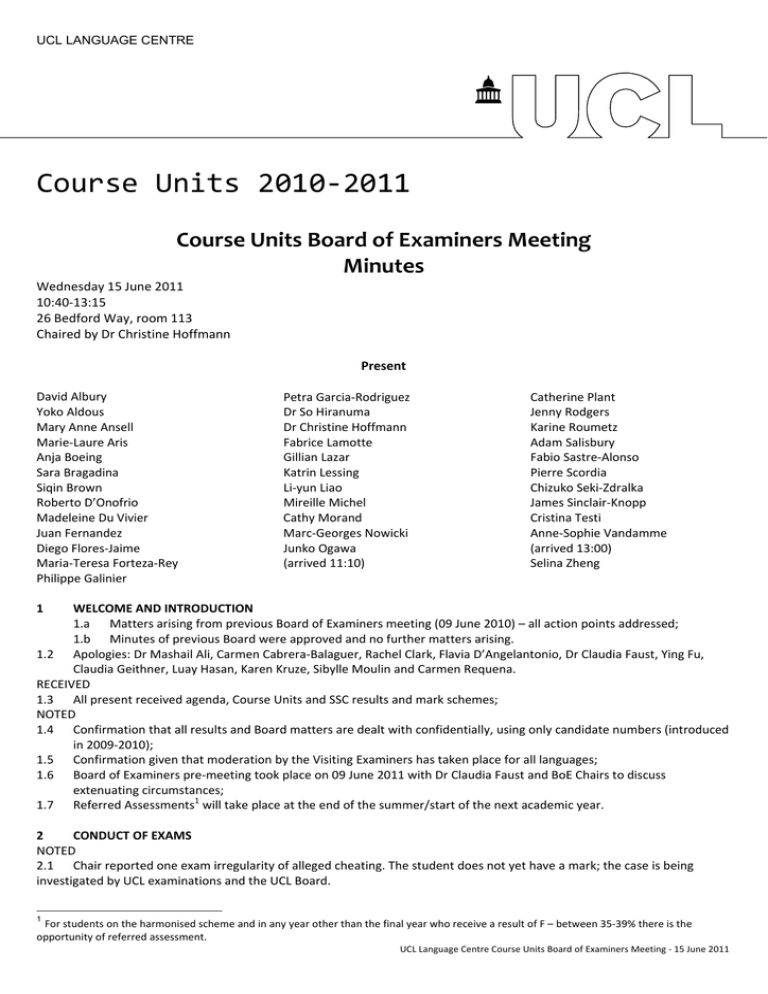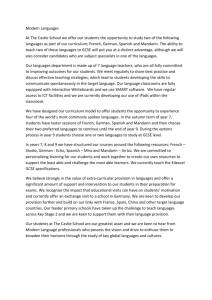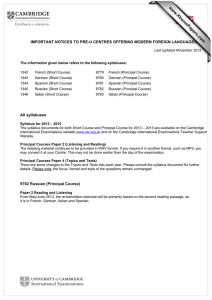Course Units 2010‐2011 Course Units Board of Examiners Meeting Minutes Wednesday 15 June 2011
advertisement

UCL LANGUAGE CENTRE Course Units 2010‐2011 Course Units Board of Examiners Meeting Minutes Wednesday 15 June 2011 10:40‐13:15 26 Bedford Way, room 113 Chaired by Dr Christine Hoffmann Present David Albury Catherine Plant Petra Garcia‐Rodriguez Yoko Aldous Jenny Rodgers Dr So Hiranuma Mary Anne Ansell Karine Roumetz Dr Christine Hoffmann Marie‐Laure Aris Adam Salisbury Fabrice Lamotte Anja Boeing Fabio Sastre‐Alonso Gillian Lazar Sara Bragadina Pierre Scordia Katrin Lessing Siqin Brown Chizuko Seki‐Zdralka Li‐yun Liao Roberto D’Onofrio James Sinclair‐Knopp Mireille Michel Cathy Morand Madeleine Du Vivier Cristina Testi Marc‐Georges Nowicki Juan Fernandez Anne‐Sophie Vandamme Junko Ogawa Diego Flores‐Jaime (arrived 13:00) (arrived 11:10) Maria‐Teresa Forteza‐Rey Selina Zheng Philippe Galinier 1 WELCOME AND INTRODUCTION 1.a Matters arising from previous Board of Examiners meeting (09 June 2010) – all action points addressed; 1.b Minutes of previous Board were approved and no further matters arising. 1.2 Apologies: Dr Mashail Ali, Carmen Cabrera‐Balaguer, Rachel Clark, Flavia D’Angelantonio, Dr Claudia Faust, Ying Fu, Claudia Geithner, Luay Hasan, Karen Kruze, Sibylle Moulin and Carmen Requena. RECEIVED 1.3 All present received agenda, Course Units and SSC results and mark schemes; NOTED 1.4 Confirmation that all results and Board matters are dealt with confidentially, using only candidate numbers (introduced in 2009‐2010); 1.5 Confirmation given that moderation by the Visiting Examiners has taken place for all languages; 1.6 Board of Examiners pre‐meeting took place on 09 June 2011 with Dr Claudia Faust and BoE Chairs to discuss extenuating circumstances; 1.7 Referred Assessments1 will take place at the end of the summer/start of the next academic year. 2 CONDUCT OF EXAMS NOTED 2.1 Chair reported one exam irregularity of alleged cheating. The student does not yet have a mark; the case is being investigated by UCL examinations and the UCL Board. 1 For students on the harmonised scheme and in any year other than the final year who receive a result of F – between 35‐39% there is the opportunity of referred assessment. UCL Language Centre Course Units Board of Examiners Meeting ‐ 15 June 2011 3. 3.1 COMMENTS OF VISITING EXAMINERS Teaching English as a Foreign Language – Gillian Lazaar (fourth and final year as VE): GL gave congratulations to the team and noted how they encourage students so well and noted the following: The team are very rigorous in the assessment, teaching and organisation; Course assessment has changed and improved over the 4 years, e.g. numerical grades given for teaching practice and descriptors given to all assessment and to teaching practice, so all very transparent; As TEFL is now part of the Cambridge CELTA program it is great to see proper referencing from students. 3.2 English for Academic Purposes (LCEN6001 and LCEN6801) – Mary‐Anne Ansell: LCEN6001 The linguistic and the listening course assessments could be more challenging; Regarding the listening, the course is currently very structured which leaves little room for testing the skills required with more authentic listening; The Researched Papers are marked within the Language Centre; it might be useful to engage staff in the students own Department to encourage a sense of partnership in supporting the development of the students; There is a necessity for evidence and argument, a concept which students do not seem to grasp; Some marking on the oral exams was generous; marking for orals can be very subjective, unlike marking on written tasks; LCEN6801 NOTED There is a necessity for tutors to give more detailed, formative feedback on the actual work (e.g. on the Take‐Home course assessment) – this is useful for students especially in the early stages of the course. Marking on the Researched Papers was generous, considering the standard of papers was not great, in particular with regards to referencing; Another element (for both courses) could be to ask the students to feedback to their tutor on the feedback and comments they receive, which would encourage them to focus on the areas they need to work on and to make a plan for this; Critical engagement in the final exam was disappointing; Students should be encouraged to write their question/essay title at the top of their answer page, for both the Take‐home paper and the final written exam; this is a useful technique which encourages students to focus on their writing requirements. Overall of the two courses the LCEN6001 courses appeared more demanding; the team might find it helpful to review how it is assessed. 3.3 Japanese – Junko Ogawa Very impressive results this year; All 1st and 2nd marking was conducted very professionally; NOTED Listening assessment: this can disadvantage those with good listening skills but poor writing skills. Might be fairer to ask for use of English in answers; Projects: very good and inspirational, however asking for use of authentic text for low levels is too demanding. 3.4 French – Sibylle Moulin (comments summarised by Chair) NOTED For the Reading and Writing exam more marks are now allocated to the final writing task, which is good. However students don’t always have time to fully complete all tasks, in particular this one, so perhaps this should be simplified; Results are superb with a good spread of marks across levels; NOTED There was a high proportion of first class mark and excellent performances at the Business and Current Affairs level, therefore in future it might be an idea to encourage some of these students – those most confident to join the next level up, and for the team to review the criteria for level allocation. 3.5 Arabic – Mashail Ali (comments summarised by Chair); This year, in contrast to last there is a noticeable dialogue between 1st and 2nd marker, as well as ‘proper’ second marking; NOTED Chair also confirmed that this year the Arabic Coordinator, Luay Hasan produced all exam papers; Arabic tutor Lamia Jamal‐Aldin requested to be withdrawn from the examination assessment process, so assessment duties were handed over to colleague Arabic tutor Farida Mounti. NOTED There are some concerns over the Grammar and Vocabulary assessments as both tutors gave different questions/tasks to their Level A groups UCL Language Centre Course Units Board of Examiners Meeting ‐ 15 June 2011 3.6 3.7 3.8 3.9 4. 4.1 4.2 4.3 4.4 4.5 4.6 4.7 5 5.1 5.2 5.3 2 ACTION Arabic team to follow up. Italian – Flavia D’angelantonio (comments summarised by Chair): Thanks given to the Italian team for the good standards of the assessment process and course content; It would be useful to have a clearer way of indicating reading and linguistic competence on the front of the exam, as it is not always clear which competence the mark is related to; Chair explained that we now use standard UCL answer books (except for second script languages) as UCL Exams felt our own LC answer books, which included specific point boxes, were too similar to theirs and it was not logistically viable to transport to exam halls. Spanish – Karen Kruse (comments summarised by Chair): The level of difficulty and the format of the listening course assessment at levels C and D should correspond more with levels B1 and B2 of the ECTS2, thus preventing the majority of students achieving a grade A, while ensuring that skills and competence are fully tested and fairly assessed. Suggestions for suitable materials and formats have already been given to the Spanish team. German – Dr Claudia Faust (comments summarised by Chair): NOTED Grammar and Vocabulary assessments must be linked to work carried out in class during term one; Projects cannot be marked above 85%, especially at low levels, it is not possible; Reading and Writing revision workshops must be offered across ALL levels. Mandarin – Ying Fu (comments summarised by Chair) Congratulations given to the Mandarin team for another successful year; The first part of the Level A Reading and Writing exam paper should be re‐formatted in order to make better task questions. This has been discussed with the Mandarin team and will be put into action next year. Ying Fu is happy to stay on as Visiting Examiner for a fourth year – all agreed. COMMENTS OF LANGUAGE COORDINATORS Mandarin: tutor Liyun Liao gave positive feedback on the academic year; Spanish: Coordinator not present, positive feedback given by tutor Maria‐Teresa Forteza‐Rey; Japanese – Dr So Hiranuma: A 30% drop in numbers has meant a challenging year; The team were able to give more support to students this year, especially low levels as revision workshops were offered and extra support given in choosing references for Projects. French – Mireille Michel: Positive feedback and thanks given to team individually, noting the following aspects that they have offered and assisted with: task chains, extra I.T skills and suggestions, worksheets to support cultural/social events and an inspiring blog. German – Anja Boeing: It has been a good year with an increase in student numbers; all course levels ran including five levels of medics/SSC courses. Italian – Roberto D’Onofrio: All courses ran, including Academic Purposes for the first time. Thanks were given to Italian team for their professionalism. Teaching English as a Foreign Language – Madeleine du Vivier: This year for the first time CELTA was offered alongside TEFL, so participants can gain external credit unlike before when the course was just UCL credited; it is now a portable qualification. All students opted to do this and all passed. There was a good range of marks. CONFIRMATION OF COURSE UNITS RESULTS The procedures and the purpose of Referred Assessment were clarified by Chair; Procedures for categorising Extenuating Circumstances were explained by Chair. It was noted that normal procedure is to not change marks unless they are borderline. Any cases will be discussed and confirmed as we reach the relevant course code. SYLLABUS A Arabic, French, German, Italian, Japanese, Mandarin and Spanish 0.5 Course Units LCAR6001, LCFR6001, LCGE6001, LCIT6001, LCJA6001, LCMA6001, LCSP6001 – All results approved. LCAR6001: Candidate RRPV9 – Extenuating Circumstances category B; all agreed mark should be raised to 50%. LCJA6001: Exam irregularity for candidate TDYR6 – raised in point 2.1 above. European Credit Transfer System UCL Language Centre Course Units Board of Examiners Meeting ‐ 15 June 2011 5.4 5.5 5.6 5.7 5.8 5.9 5.10 5.11 5.12 5.13 5.14 5.15 5.16 5.17 SYLLABUS B Arabic, French, German, Italian, Japanese, Mandarin and Spanish 0.5 and 1.0 Course Units LCAR6002, LCFR6002, LCGE6002, LCIT6002, LCJA6002, LCMA6002, LCSP6002, LCAR6012, LCFR6012, LCGE6012, LCIT6012, LCJA6012, LCMA6012, LCSP6012 – All results approved. SYLLABUS C Arabic, French, German, Italian, Japanese, Mandarin and Spanish 0.5 Course Units French, German, Italian, Japanese, Mandarin and Spanish 1.0 Course Units LCAR6003, LCFR6003, LCGE6003, LCIT6003, LCJA6003, LCMA6003, LCSP6003, LCFR6023, LCGE6023, LCIT6023, LCJA6023, LCMA6023, LCSP6023 – All results approved. LCFR6003: Candidate RDJZ5 – Extenuating Circumstances category C; less serious, all agreed mark should be left at 51%; LCFR6003: Candidate SGWJ4 – queried by tutor but not categorised as relevant (one‐off illness). SYLLABUS D French, German, Japanese, Mandarin and Spanish 0.5 Course Units French, German, Italian, Japanese, Mandarin and Spanish 1.0 Course Units LCFR6004, LCGE6004, LCJA6004, LCMA6004, LCSP6004, LCFR6034, LCGE6034, LCIT6034, LCJA6034, LCMA6034, LCSP6034 – All results approved. LCSP6034: Candidate RDWZ2 – Extenuating Circumstances category C; less serious, all agreed mark should be left at 60%. BUSINESS AND CURRENT AFFAIRS French, German, Italian, Japanese, Mandarin and Spanish 0.5 Course Units French, German, Italian, Mandarin and Spanish 1.0 Course Units LCFR6005, LCGE6005, LCIT6005, LCJA6005, LCMA6005, LCSP6005, LCFR6045, LCGE6045, LCIT6045, LCJA6045, LCMA6045, LCSP6045 – All results approved. LCGE6045: Candidate SVBX6 – taking Oral exam today and still needs to take Reading and Writing exam, however may withdraw from course; would not normally be permitted deferred assessment in final year. LCJA6005: Candidate QXWY4 – sat oral exam this morning. CURRENT AFFAIRS AND CULTURE (Social, Historical and Political) French, German, Italian and Spanish 0.5 and 1.0 Course Units LCFR6006, LCGE6006, LCIT6006, LCSP6006, LCFR6056, LCGE6056, LCIT6056, LCSP6056 – All results approved. PROFESSIONAL PURPOSES II French, German, Italian 0.5 Course Units French, German, Italian and Spanish 1.0 Course Units LCFR6007, LCGE6007, LCIT6007, LCSP6007, LCFR6067, LCGE6067, LCIT6067, LCSP6067 – All results approved. LCFR6007: Candidate STRJ6 – took LCFR6007 and LCFR6807 (Academic Purposes II) so should have a mark of 71%, instead of a result of NC. ACADEMIC PURPOSES – INTRODUCTION French 0.5 Course Unit LCFR6803 – All results approved. ACADEMIC PURPOSES II French, German, Italian, Japanese and Spanish 0.5 Course Units French, German and Japanese 1.0 Course Units LCFR6807, LCGE6807, LCIT6807, LCJA6807, LCSP6807, LCFR6867, LCGE6867, LCIT6867, LCJA6867, LCSP6867 – All results approved. LCFR6807: Candidates RJSS7 (75%) and SDRM9 (62%) both took LCFR6807 and LCFR6007 (Professional Purposes II), so should each have a mark (as above) and not a result of NC. TRANSLATION SKILLS French and German 0.5 Course Units LCFR6907, LCGE6907, LCIT6907, LCSP6907 – All results approved. FRENCH FOR ART HISTORIANS 0.5 COURSE UNIT LCFA6801 – Results approved ITALIAN FOR ART HISTORIANS 0.5 COURSE UNIT LCIA6801 – Results approved ENGLISH LANGUAGE SKILLS 0.5 COURSE UNIT LCEN6001 – Results approved ACADEMIC WRITING IN ENGLISH FOR NON‐NATIVE SPEAKERS 0.5 COURSE UNIT LCEN6801 – Results approved TEACHING ENGLISH AS A FOREIGN LANGUAGE 1.0 COURSE UNIT LCTE7900 – Results approved UCL Language Centre Course Units Board of Examiners Meeting ‐ 15 June 2011 TEFL has 6 pieces of assessment, which is not compatible with PORTICO, which puts the first 2 marks together. As a result, after discussion amongst the TEFL team it was agreed by all that the following marks should be amended: Candidate SHQG2 – change from 70 to 69% Candidate QYFX1 – change from 67 to 66% Candidate TFNC0 – change from 56 to 55% 6 6.1 6.2 6.3 6.4 6.5 6.6 7 7.1 8 8.1 8.2 CONFIRMATION OF SSC RESULTS SYLLABUS A Arabic, French, German, Italian, Japanese, Mandarin and Spanish SSC’s – All results approved. SYLLABUS B Arabic, French, German, Italian, Japanese, Mandarin and Spanish SSC’s – All results approved. SYLLABUS C Arabic, French, Japanese, Mandarin and Spanish SSC’s – All results approved. SYLLABUS D French, German, Japanese and Spanish SSC’s – All results approved. BUSINESS AND CURRENT AFFAIRS French, German, Japanese and Mandarin SSC’s – All results approved. PROFESSIONAL PURPOSES German SSC – Results approved. DATES FOR 2011‐2012 Board of Examiners meeting: Thursday 07 or Friday 08 June 2012 – to be confirmed. ANY OTHER BUSINESS Intercollegiate students: it was noted that students from the School of Oriental and African Studies tend not to register for our courses anymore (this year just 1, compared to approximately 60 in previous years); this has affected numbers for some courses and languages, in particular Italian, Spanish and TEFL. The exact reason for this is not confirmed; Summer Intensive Modern Foreign Language Courses will run from 11‐22 July 2011, registration is now open, and a 4‐week Summer CELTA fee‐paying course will run from 04 July 2011. Programme for June Review meetings and Staff Development to be circulated to all tutors this week. 8.3 Meeting closed at 13:15 Course Units Administrator +44 (0)20 7679 5481 01 August 2011 UCL Language Centre Course Units Board of Examiners Meeting ‐ 15 June 2011



